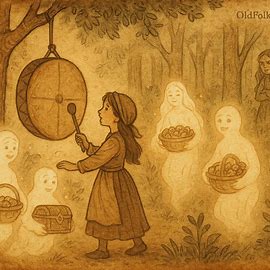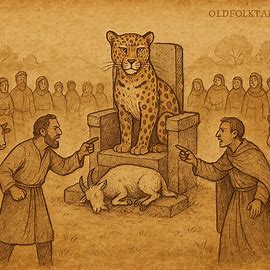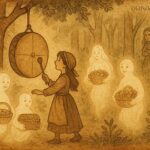Chanda married Milika because she was not only beautiful but also wise and modest. For five years, they lived in harmony and happiness, but sorrow slowly crept into their lives when no children came. Chanda’s relatives began urging him to marry another woman, for they believed a man’s legacy must be secured through sons and daughters. Whenever these talks arose, Milika wept bitterly. Yet Chanda, who loved her deeply, promised he would never send her away.
Milika, though heartbroken, was sensible and selfless. She felt it was her duty to ensure her husband had children. With quiet determination, she searched for a woman who could be a worthy second wife for Chanda. Eventually, she found Eneli, the daughter of a hunter, who seemed to embody the qualities Milika sought. Through tears and repeated pleas, Milika convinced Chanda to marry Eneli, though he initially resisted.
The wedding was celebrated with great rejoicing among Chanda’s relatives, who admired his wealth and ability to provide for two wives. Soon after, Eneli bore him a son. Elders showered her with gifts and honours, while Milika was left to shoulder all the household work, cooking, washing, and serving the endless stream of visitors. Her heart ached to hold and comfort the baby, but her hands were always full of chores.
Eneli, meanwhile, declared she was too occupied with the child to handle household duties, so Milika was left with every burden. Chanda’s affection shifted. He adored Eneli for giving him a son, while Milika became almost invisible, treated as little more than a servant in her own home. Harsh words often fell upon her, yet she endured, believing a woman’s place was beside her husband.
READ: Muti Gets a Husband: A Bemba Folktale from Zambia
Years passed. Eneli bore more children, gaining honour as the lady of the house, while Milika’s status dwindled. Then, a terrible drought swept the land. Chanda prepared to move his cattle and family to a safer place. Hitching oxen to his cart, he loaded his children and Eneli inside. Milika, clutching her few belongings, tried to climb in as well.
“Where do you think you are going?” Chanda mocked. “Get down. In this drought, I cannot afford two wives. Stay here and look after the house.”
Stunned, Milika stepped down. Her humiliation was complete as the children, and even Eneli, laughed at her. Deeply wounded, she ran back inside, tears streaming down her face. Alone, she cried out to her ancestors:
“Fathers of my father! How can you allow me to suffer such insult for no wrong of mine? Grant me children who will bring me joy and honour, and wipe away these years of scorn.”
Exhausted from weeping, she fell asleep. In a dream, an ancestor whispered: “Milika, your troubles are over. Go to the shrine tomorrow and offer a monkey fruit.”
Though puzzled, she obeyed. She carefully selected the finest monkey fruit and laid it at the shrine. Suddenly, the fruit split apart with a crash, and three radiant girls stepped out.
“Mother, mother!” they cried. “We have come to live with you. Promise you will never speak a harsh word to us.”
Overjoyed, Milika embraced them and promised tender love. Her life bloomed anew. The rains returned, the land flourished, and her daughters grew into diligent and admired young women. Yet Milika longed for sons.
Once more, her ancestor came in a dream, instructing her to offer another monkey fruit. Again, the fruit broke open, and three strong boys emerged, calling her mother and asking for her kindness. She welcomed them with gratitude, and the boys thrived as hunters and farmers.
Her children brought her respect, honour, and wealth. She married her daughters to neighbouring chieftains and saw her elder sons wed beautiful young women. Wherever she went, people honoured her as the mother of fine, prosperous children.
Still, one ache lingered in her heart. Chanda and Eneli had never returned to witness her happiness. Only her youngest son and daughter remained unmarried. Milika longed for the day they too would be settled, so she could confront her husband and show him the blessings she had received despite his cruelty.
But impatience grew in her heart. One day, exasperated, she scolded the two youngest:
“Why do you delay? Are you not old enough to marry and raise families of your own?”
The boy and girl looked at her with sorrow. “Our human mother has scolded us,” they said together. “We, who were born of the fruit, must return to the fruit.”
Their lament echoed louder and louder. Soon, Milika’s other children rushed home, drawn by the cry. Hand in hand, they walked solemnly toward the monkey fruit tree, chanting:
“We, born of the fruit, must go back to the fruit.”
One by one, they entered a fruit and vanished forever. The whole village gathered, helpless witnesses to the sorrowful return. Milika, once blessed beyond measure, was left broken-hearted and alone.
Moral Lesson
This Zambian folktale teaches that patience, humility, and resilience bring blessings even in times of sorrow. Yet it also warns against impatience and harsh words, for a single moment of anger can undo years of love and sacrifice. Words carry great power, used with kindness, they nurture life; spoken in anger, they may destroy it.
Knowledge Check
Q1: Who were the main characters in this Zambian folktale?
A: Milika, Chanda, and Eneli.
Q2: Why did Milika search for a second wife for Chanda?
A: Because she could not bear children and wanted her husband to have heirs.
Q3: How did Milika receive her children?
A: Through offerings of monkey fruits at the ancestral shrine, which produced sons and daughters.
Q4: Why did Milika’s children return to the fruit?
A: Because she broke her promise by scolding them harshly.
Q5: What is the central lesson of this folktale?
A: Patience and kindness bring blessings, but impatience and harsh words can cause great loss.
Q6: What is the cultural origin of this story?
A: It is a folktale from Zambia.
Source: Kalulu the Hare and Other Zambian Folk-Tales, Zambia







